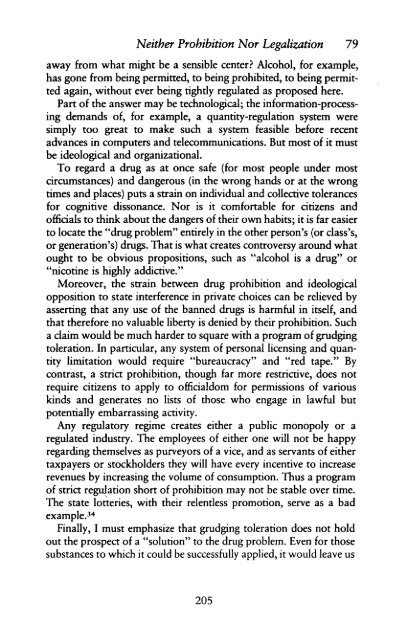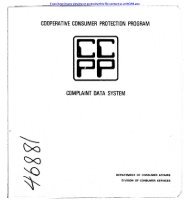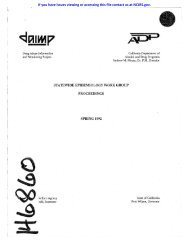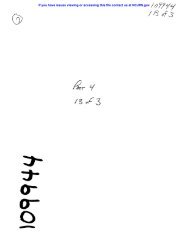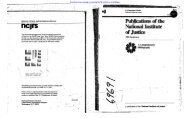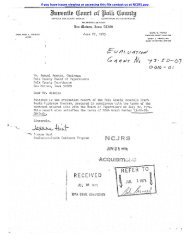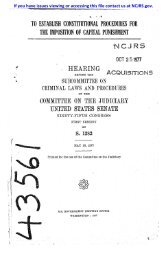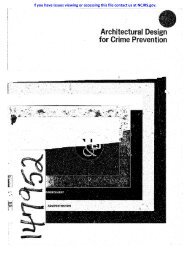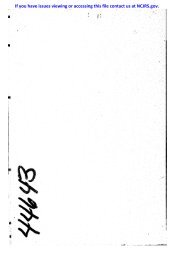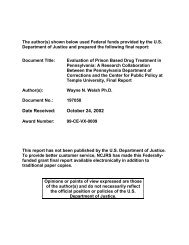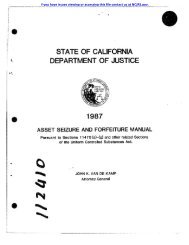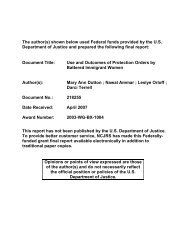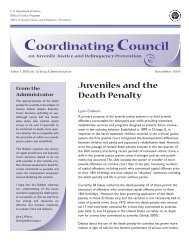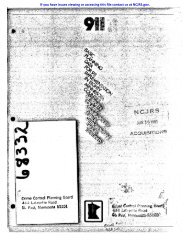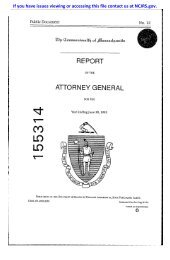- Page 1 and 2:
If you have issues viewing or acces
- Page 4 and 5:
Criminal Justice Contemporary Liter
- Page 6 and 7:
Drug Use and Drug Policy Edited wit
- Page 8 and 9:
Contents vii Xlll 1 24 45 60 69 75
- Page 10 and 11:
Series Introduction At the turn of
- Page 12 and 13:
SERIES INTRODUCTION ix and (4) that
- Page 14 and 15:
Volume Introduction Beginning in 19
- Page 16 and 17:
VOLUME INTRODUCTION xiii Falkin, Mi
- Page 18 and 19:
VOLUME INTRODUCTION XV Peter Reuter
- Page 20 and 21:
VOLUME INTRODUCTION xvii Johnson, B
- Page 22 and 23:
Setting the Public Agenda: "Street
- Page 24 and 25:
"Street Crime" and Drug Use 427 res
- Page 26 and 27:
"Street Crime" and Drug Use 429 dis
- Page 28 and 29:
"Street Crime" and Drug Use 431 Her
- Page 30 and 31:
"Street Crime" and Drug Use 433 J J
- Page 32 and 33:
"Street Crime" and Drug Use 435 "6
- Page 34 and 35:
"Street Crime" and Drug Use 437 Tab
- Page 36 and 37:
"Street Crime* and Drug Use 439 in_
- Page 38 and 39:
"Street Crime" and Drug Use 441 coe
- Page 40 and 41:
"Street Crime" and Drug Use 443 the
- Page 42 and 43:
"Street Crime" and Drug Use 445 Ref
- Page 44 and 45:
"Street Oime" and Drug Use 447 Nels
- Page 46 and 47:
Clear et al. I CORRECTIONAL ALTERNA
- Page 48 and 49:
Clear et al. / CORRECTIONAL ALTERNA
- Page 50 and 51:
Clear et al. / CORRECTIONAL ALTERNA
- Page 52 and 53:
Clear et al. / CORRECTIONAL ALTERNA
- Page 54 and 55:
Clear et al. / CORRECTIONAL ALTERNA
- Page 56 and 57:
Clear et aL / CORRECTIONAL ALTERNAT
- Page 58 and 59:
Clear et al. / CORRECTIONAL ALTERNA
- Page 60 and 61:
Clear et aL / CORRECTIONAL ALTERNAT
- Page 62 and 63:
Clear et aLI CORRECTIONAL ALTERNATI
- Page 64 and 65:
Clear et al. I CORRECTIONAL ALTERNA
- Page 66 and 67:
The Setting for the Crack Era: Macr
- Page 68 and 69:
Dunlop & Johnson Micro Forces, Micr
- Page 70 and 71:
Dunlap & Johnsoe Macro Forces, Micr
- Page 72 and 73:
Dunlap & Johnson Sonya left high sc
- Page 74 and 75:
Dunlap & Johnson (and avoid testing
- Page 76 and 77:
Dunlap & Johnson Macro Forces, Micr
- Page 78 and 79:
Dunlap & Johnson Macro Forces, Micr
- Page 80 and 81:
Dunlap & Johnson Se_rvice$. Jdmu~n.
- Page 82 and 83:
answer sessions, audiovisual materi
- Page 84 and 85:
DARE Meta-Analysis groups was obtai
- Page 86 and 87:
DARE Met,a-Analysis The DARE core c
- Page 88:
DE Meta-Analysis APPENDIX A---Conti
- Page 91 and 92:
32 FEDERAL PROBATION September 1994
- Page 93 and 94:
34 FEDERAL PROBATION September 1994
- Page 95 and 96:
36 FEDERAL PROBATION September 1994
- Page 97 and 98:
972 FENDRICH AND XU accurately disc
- Page 99 and 100:
974 FENDRICH AND XU subject charact
- Page 101 and 102:
976 FENDRICH AND XU Table 3. Urine
- Page 103 and 104:
978 FENDRICH AND XU Table 4. Drug U
- Page 105 and 106:
980 FENDRICH AND XU caine use when
- Page 107 and 108:
982 FENDRICH AND XU may also reflec
- Page 109 and 110:
984 FENDRICH AND XU COHEN, J. (1988
- Page 111 and 112:
324 !~ Filippone based in the south
- Page 113 and 114:
326 R. Filippone ticking. Escobar s
- Page 115 and 116:
328 R. Filippone These subordinate
- Page 117 and 118:
330 R. Filippone done by pisadores,
- Page 119 and 120:
332 R~ Filippone smuggle cocaine. C
- Page 121 and 122:
334 R. Filippone Colombians who wor
- Page 123 and 124:
336 R. Filippone Blandon, a former
- Page 125 and 126:
338 K Filippone money on corrupting
- Page 127 and 128:
340 R. Filippone The most infamous
- Page 129 and 130:
342 K Filippone It is obvious that
- Page 131 and 132:
344 R. Filippone 48. Collett, The C
- Page 133 and 134:
208/C.JPR during the late 1970s and
- Page 135 and 136:
210/CJPR Huffs study does suggest a
- Page 137 and 138:
212/CJPR was a drug distributor or
- Page 139 and 140:
214/CJPR certain large amount of dr
- Page 141 and 142:
21fi/CJPR of drugs (which, as demon
- Page 143 and 144:
218/CJPR murder," assuming the tria
- Page 145 and 146:
220/CJPR decisions concerning when
- Page 147 and 148:
222/CJPR Table 1 Sentencing Guideli
- Page 149 and 150:
224/C.JPR (possibly unwittingly) in
- Page 151 and 152:
226/CJPR 2. Incentive Gain Time - F
- Page 153 and 154:
228/CJPR Huff, C., A. Rattner and E
- Page 155 and 156:
INCIARDI/Mc BRIDE~Me COY/CHII'WD(~
- Page 157 and 158:
INCIARDI/Mc BRIDE/Mc COY/CHITWOOD R
- Page 159 and 160:
INCIARDI/Mc BRIDE~Me COY/CHITWOOD R
- Page 161 and 162:
Dr BRIDE/McGOYICHH3,VOODRECENT RESE
- Page 163 and 164:
INC[ARDI/Mc ~,IDE/Mc. ~Y/CHII'WOOD
- Page 165 and 166:
fiVCIAP, DI/Mc BRIDE/Mc COY/CHI'IWO
- Page 167 and 168:
INCIARDIIMc BRIDEIMg COYICH~ RE~NT
- Page 169 and 170:
h'VCIARDI/Mc BRIDE~Me COY/Dr-IITWOO
- Page 171 and 172:
INCIARDI/Mc BRIDE~Me COY/CHtTWO(~ R
- Page 173 and 174:
~"C24RDI/Mc BRIDE/Mc COY/CHFIWOOD R
- Page 175 and 176: 8 THE ICE AGE rediscovering problem
- Page 177 and 178: 10 THE ICE AGE 1989:55; Wiedrich 19
- Page 179 and 180: 12 THE ICE AGE of new activity was
- Page 181 and 182: 14 THE ICE AGE Table 1. Chronology
- Page 183 and 184: 16 THE ICE AGE 1990 and in the Wash
- Page 185 and 186: 18 THE ICE AGE (U.S. Congress: Re-E
- Page 187 and 188: 20 THE ICE AGE be self-fulfilling i
- Page 189 and 190: 22 THE ICE AGE Such entrepreneurs m
- Page 191 and 192: 24 THE ICE AGE which Democrats were
- Page 193 and 194: 26 THE ICE AGE so successful that i
- Page 195 and 196: 28 THE ICE AGE Second, the intense
- Page 197 and 198: 30 THE ICE AGE Miller, M~ and N.J.
- Page 200 and 201: 1694o6 Mark A.R. Kleiman Neither Pr
- Page 202 and 203: Neither Prohibition Nor Legalizatio
- Page 204 and 205: Neither Prohibition Nor Legalizatio
- Page 206 and 207: Neither Prohibition Nor Legalizatio
- Page 208 and 209: Neither Prohibition Nor Legalizatio
- Page 210 and 211: Neither Prohibition Nor Legalizatio
- Page 212 and 213: Neither Prohibition Nor Legalizatio
- Page 214 and 215: Neither Prohibition Nor Legalizatio
- Page 216 and 217: Neither Probibition Nor Legalizatio
- Page 218 and 219: Neither Prohibition Nor Legalizatio
- Page 220 and 221: Neither Prohibition Nor Legalizatio
- Page 222 and 223: Neither Prohibition Nor Legalizatio
- Page 224 and 225: Neither Prohibition Nor Legalizatio
- Page 228 and 229: Neither Prohibition Nor Legalizatio
- Page 230: Neither Prohibition Nor Legalizatio
- Page 233 and 234: quite as radical as invading Panama
- Page 235 and 236: grounds to believe, that anyone - U
- Page 237 and 238: ed to drug trafficking, including m
- Page 239 and 240: high value on their word and reputa
- Page 241 and 242: 10 a foregone conclusion by all of
- Page 243 and 244: 12 27. 28. 29. 30. 31. Boston Globe
- Page 245 and 246: 258 THE PRISON JOURNAL / September/
- Page 247 and 248: 260 THE PRISON JOURNAL I September/
- Page 249 and 250: 262 THE PRISON JOURNAL / September/
- Page 251 and 252: 264 THE PRISON JOURNAL / September/
- Page 253 and 254: 266 THE PRISON JOURNAL/September/De
- Page 255 and 256: 268 THE PRISON JOURNAL I September/
- Page 257 and 258: 270 THE PRISON JOURNAL / September/
- Page 259 and 260: 272 THE PRISON JOURNAL / September/
- Page 261 and 262: 274 M PRISON JOURNAL / September/De
- Page 263 and 264: 276 THE PRISON JOURNAL / September/
- Page 265 and 266: 278 THE PRISON JOURNAL / September/
- Page 267 and 268: 314 ASSET FORFEITURE PROGRAMS again
- Page 269 and 270: 316 ASSET FORFEITURE PROGRAMS 1988
- Page 271 and 272: 318 ASSET FORFEITURE PROGRAMS from
- Page 273 and 274: 320 ASSET FORFEITURE PROGRAMS Exami
- Page 275 and 276: 322 ASSET FORFEITURE PROGRAMS overl
- Page 277 and 278:
324 ASSET FORFEITURE PROGRAMS such
- Page 279 and 280:
326 ASSET FORFEITURE PROGRAMS cance
- Page 281 and 282:
328 ASSET FORFEITURE PROGRAMS and d
- Page 283 and 284:
330 ASSET FORFEITURE PROGRAMS state
- Page 285 and 286:
332 ASSET FORFEITURE PROGRAMS perso
- Page 287 and 288:
334 ASSET FORFEITURE PROGRAMS Eriks
- Page 290 and 291:
Ethan A. Nadelmann Thinking Serious
- Page 292 and 293:
Alternatives to Drug Prohibition 87
- Page 294 and 295:
Alternatives to Drug Prohibition 89
- Page 296 and 297:
Alternatives to Drug Prohibition 91
- Page 298 and 299:
Alternatives to Drug Prohibition 93
- Page 300 and 301:
Alternatives to Drug Prohibition 95
- Page 302 and 303:
Alternatives to Drug Prohibition 97
- Page 304 and 305:
Alternatives to Drug Prohibition 99
- Page 306 and 307:
Alternatives to Drug Prohibition 10
- Page 308 and 309:
Alternatives to Drug Prohibition 10
- Page 310 and 311:
Alternatives to Drug Prohibition 10
- Page 312 and 313:
Alternatives to Drug Probibition 10
- Page 314 and 315:
Alternatives to Drug Prohibition 10
- Page 316 and 317:
Alternatives to Drug Prohibition 11
- Page 318 and 319:
Alternatives to Drug Prohibition 11
- Page 320 and 321:
Alternatives to Drug Prohibition 11
- Page 322 and 323:
Alternatives to Drug Prohibition 11
- Page 324 and 325:
Alternatives to Drug Prohibition 11
- Page 326 and 327:
Alternatives to Drug Prohibition 12
- Page 328 and 329:
Alternatives to Drug Prohibition 12
- Page 330 and 331:
Alternatives to Drug Prohibition 12
- Page 332 and 333:
Alternatives to Drug Prohibition 12
- Page 334 and 335:
Alternatives to Drug Prohibition 12
- Page 336 and 337:
Alternatives to Drug Prohibition 13
- Page 338 and 339:
I {=g Ltll The Journal of Drug Issu
- Page 340 and 341:
REVISITING WOMEN AND DRUGS men and
- Page 342 and 343:
REVISITING WOMEN AND DRUGS twenty-y
- Page 344 and 345:
REVISITING WOMEN AND DRUGS the dome
- Page 346 and 347:
REVISITING WOMEN AND DRUGS weaker t
- Page 348 and 349:
REVISITING WOMEN AND DRUGS price cu
- Page 350 and 351:
REVISITING WOMEN AND DRUGS among dr
- Page 352 and 353:
REVISITING WOMEN AND DRUGS mortalit
- Page 354 and 355:
REVISITING WOMEN AND DRUGS poverty,
- Page 356 and 357:
REVISITING WOMEN AND DRUGS Drug Use
- Page 358 and 359:
REVISITING WOMEN AND DRUGS Table 6
- Page 360 and 361:
REVISITING WOMEN AND DRUGS to be in
- Page 362 and 363:
REVISITING WOMEN AND DRUGS Table 8
- Page 364 and 365:
REVISITING WOMEN AND DRUGS distribu
- Page 366 and 367:
REVISITING WOMEN AND DRUGS to buy d
- Page 368 and 369:
REVISITING WOMEN AND DRUGS The mode
- Page 370 and 371:
REVISITING WOMEN AND DRUGS more ser
- Page 372 and 373:
REVISITING WOMEN AND DRUGS NOTES 1.
- Page 374 and 375:
REVISITING WOMEN AND DRUGS 19. Howe
- Page 376 and 377:
REVISITING WOMEN AND DRUGS Daly, K.
- Page 378 and 379:
REVISITING WOMEN AND DRUGS Hagan, J
- Page 380 and 381:
REVISITING WOMEN AND DRUGS Maher, L
- Page 382 and 383:
REVISITING WOMEN AND DRUGS Siegel,
- Page 384:
REVISITING WOMEN AND DRUGS Appendix
- Page 387 and 388:
16 Peter Reuter combine the two deb
- Page 389 and 390:
18 Peter Reuter sale) in part come
- Page 391 and 392:
20 Peter Reuter in this area is bar
- Page 393 and 394:
22 Peter Reuter I include the recen
- Page 395 and 396:
24 Peter Reuter TAnL~ 2. Dispositio
- Page 397 and 398:
26 Peter Reuter To calculate roughl
- Page 399 and 400:
28 Peter Reuter that these policies
- Page 401 and 402:
30 Peter Reuter surveys also pointe
- Page 403 and 404:
32 Peter Reuter The DUF data have o
- Page 405 and 406:
34 Peter Reuter smokers and the 10
- Page 407 and 408:
36 Peter Reuter Unfortunately, disc
- Page 409 and 410:
38 Peter Reuter A striking feature
- Page 411 and 412:
40 Peter Reuter percentage has rise
- Page 413 and 414:
42 Peter Reuter prevent marijuana u
- Page 415 and 416:
44 Peter Reuter that enforcement, h
- Page 417 and 418:
46 Peter Reuter Nonwhites are more
- Page 419 and 420:
48 Peter Reuter perhaps because the
- Page 421 and 422:
50 Peter Reuter 3tMark Kleiman sens
- Page 423 and 424:
52 Peter Reuter s4See the recent co
- Page 425 and 426:
Review of the literature In general
- Page 427 and 428:
skeptical about the possibility tha
- Page 429 and 430:
of the "hood" (neighborhood) and be
- Page 431 and 432:
8 Twenty-four gang members reported
- Page 433 and 434:
10 phony drugs by a seller who will
- Page 435 and 436:
12 some individuals and groups "bei
- Page 437 and 438:
14 References Inciardi, James A., "
- Page 440 and 441:
STUDYING DRUGS IN RURAL AREAS: NOTE
- Page 442 and 443:
Weisheit / DRUGS IN RURAL AREAS 215
- Page 444 and 445:
Weisheit / DRUGS IN RURAL AREAS 217
- Page 446 and 447:
Weisheit / DRUGS IN RURAL AREAS 219
- Page 448 and 449:
Weisheit / DRUGS IN RURAL AREAS 221
- Page 450 and 451:
Weisheit I DRUGS IN RURAL AREAS 223
- Page 452 and 453:
Weisheit / DRUGS IN RURAL AREAS 225
- Page 454 and 455:
Weisheit I DRUGS IN RURAL AREAS 227
- Page 456 and 457:
Weisheit / DRUGS IN RURAL AREAS 229
- Page 458 and 459:
Weisheit / DRUGS IN RURAL AREAS 231
- Page 460 and 461:
Acknowledgments Beckett, Katherine.


